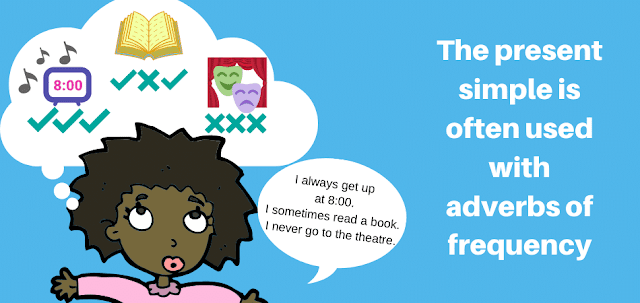14.01.2021
Lesson 2
Daily Tasks
Present Simple Tense
(інша назва Present Indefinite)
Теперішній
неозначений час
Let’s learn the rules!
(Вивчаємо правила утворення теперішнього
неозначеного часу.)
Ми використовуємо Present Simple, щоб розповісти про регулярну,
повторювану дію. Це може бути звичка,
хобі, щоденна подія, намічена подія або щось, що трапляється часто.
Про необхідність використання цього часу нам підказують "маячки часу" (adverbs of frequency):
|
always /ˈɔːlweɪz/ завжди |
|
usually /ˈjuːʒʊəli/ зазвичай |
|
often /ˈɒf(ə)n/ часто |
|
sometimes /ˈsʌmtaɪmz/ іноді |
|
seldom/rarely /ˈsɛldəm///ˈreəli/
рідко |
Утворення Present Simple
У розповідному реченні дієслово з особами I/we/you/they вживається у початковій
формі (інфінітив без частки to).
For example:
They usually play football on Sundays.
Вони зазвичай грають у футбол по неділях.
Зверніть увагу!
До дієслів, які
вживаються у 3 особі однини (he, she, it) додається
закінчення -s.
For example:
As a rule
he/she plays football
on Saturdays. – Як правило, він/вона грає у футбол по суботам.
При додаванні закінчення -s потрібно слідувати наступним правилам:
1. Якщо дієслово закінчується на -s, -ss, -sh, -ch, -x, -o, → додається -es:
He always washes up after dinner. – Він завжди миє посуд після вечері.
2. Якщо дієслово закінчується на приголосну + -у
→ -y замінюється на –i +-es:
My brother (he)
usually tidies up his room at weekends. Мій брат зазвичай
прибирає свою кімнату на вихідних.
Заперечне
речення утворюється за допомогою do/does + not + дієслово
Допоміжне дієслово does використовується лише з займенниками третьої особи однини (he/she/it). В інших
випадках потрібно вживати do. Слова do/does та not можна
скорочувати та зливати в одне don’t/doesn’t. Коли вживається допоміжне дієслово does, закінчення s/es
у дієслова забирається.
For example:
Normally I do not walk my dog in the morning. – Зазвичай я не вигулюю свого собаку вранці.
My father (he) does
not cook breakfast for the family every day . – Мій тато не
готує сніданок для нашої сім’ї щодня.
Запитальне речення утворюється за допомогою допоміжних дієслів do/does на початку речення: Do/Does + іменник + дієслово.
For example:
Do you go to school every
day? – Ти ходиш до школи щодня?
Does she usually help_ her
mom about the house? – Вона зазвичай
допомагає мамі по дому?
Зверніть увагу!!!!!
Якщо в реченні є does, смислове дієслово
втрачає літеру –s. (Does приходить – s уходить).
· Task 1. SB: Exercise 2, page 37 – Listen, read and translate. (Прослухай, прочитай та переклади.)
· Task 2. SB: Exercise 1, page 37 – Listen, put ticks or crosses in the
table. (Прослухай, постав галочки, або хрестики у таблиці.)
· Task 3.WB: Exercise 1, page 37 – Read and write about yourself. (Прочитай та напиши про себе.)
Task 4. Click on the link to revise the time. (Тисни на посилання, щоб повторити як називати час.)
Click on the diamonds to label the time.
Task 5. Click on the link to complete the task. (Тисни на покликання, щоб виконати завдання).
Task 6. Click on the link to complete the task. (Тисни на покликання, щоб виконати завдання).
Прослухай запис (натиснувши на зображення зі звуком) та перетягни на нього відповідне зображення годинника).
Don't forget to send the completed task to my email address. (Не забудь відправити виконане завдання мені на імейл): duchenko25school@gmail.com
Hometask:
- Learn the rules of using Present Simple (Вивчити правила вживання Present Simple).
-
WB: Exercise 2, 3, page 37
- PB Ex. 1,2,3 p. 22-23
















































